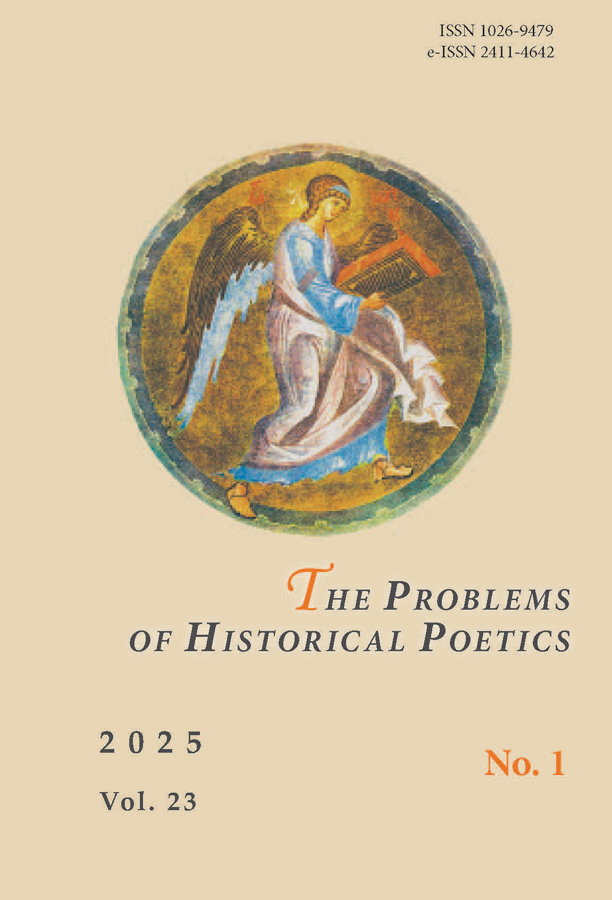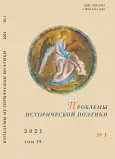Church Calendar, Gospel and Liturgical Text in the Novel The Raw Youth and A Writer’s Diary (1876) by Fyodor Dostoevsky
- Authors: Fedorova E.A.1
-
Affiliations:
- P. G. Demidov Yaroslavl State University
- Issue: Vol 19, No 1 (2021)
- Pages: 258-282
- Section: Articles
- URL: https://bakhtiniada.ru/1026-9479/article/view/285299
- DOI: https://doi.org/10.15393/j9.art.2021.9182
- ID: 285299
Cite item
Full Text
Abstract
F.M. Dostoevsky’s novel The Raw Youth (1874–1875) and A Writer’s Diary (1876) were created in the tradition of Christian calendar prose, which is aligned with sacred time. The two works are united by the idea of the religious transformation of personality, the salvation of the soul and unification around the Gospel Truth, the search for ideal foundations in the Russian people, and reflections on their purpose. Dostoevsky introduces Easter narratives into the novel and into A Writer’s Diary in 1876: the story of Makar Dolgoruky about the merchant Skotoboinikov, the opera by Trishatov, the story The Peasant Marey. The plot and storyline motives of these works and the novel go back to the parable of the Prodigal Son and the Book of Job. They share the motives of suffering, redemption and resurrection. A Writer’s Diary of 1876, which utilizes a system of references to the novel, starts from January and contains a reference to the celebration of the Nativity (the Christmas story The Beggar Boy at Christ’s Christmas Tree, quotes from a Christmas worship service), and ends in December, at the beginning of advent. A Writer’s Diary contains an appeal to Christmas and Easter as the most significant dates of the church calendar and the writer’s personal biographical time. In the chapter More on a Simple but Tricky Case (December), Dostoevsky recalls how he survived the December 22 execution on the Semyonovsky parade ground and a revival on Christmas Eve; in the Easter story The Peasant Marey (February), he tells the story of how he acquired faith in the Russian people in penal servitude during Easter. The author’s position in the novel The Raw Youth and A Writer’s Diary of 1876 can’t be comprehended without referring to the gospel and liturgical text. The Gospel parable of the Prodigal Son and the Book of Job, which are referenced in the novel and A Writer’s Diary, are read in church before and during Great Lent.
About the authors
Elena A. Fedorova
P. G. Demidov Yaroslavl State University
Author for correspondence.
Email: sole11@yandex.ru
ORCID iD: 0000-0001-7756-2499
PhD (Philology), Professor of the Department of Theory and Practice of Commu- nication
Russian Federation, YaroslavlReferences
- Aleksandr (Mileant), episkop. Svyashchennoe Pisanie Vetkhogo Zaveta [The Holy Scripture of the Old Testament]. Available at: https://predanie.ru/ book/69096-svyaschennoe-pisanie-vethogo-zaveta (accessed on April 7, 2020). (In Russ.)
- Gabdullina V. I. Avtorskiy diskurs F. M. Dostoevskogo: problema izucheniya [The Author’s Discourse of F. M. Dostoevsky: The Problem of Studying]. Barnaul, Altai State Pedagogical Academy Publ., 2010. 138 p. (In Russ.)
- Gavrilova L. A. Communication Strategies and a Evangelical Quote in “A Writer’s Diary” by F. M. Dostoevsky. In: Problemy istoricheskoy poetiki [The Problems of Historical Poetics], 2015, no. 13, pp. 287–303. Available at: https://poetica.pro/files/redaktor_pdf/1449862951.pdf (accessed on April 07, 2020). doi: 10.15393/j9.art.2015.2653 (In Russ.)
- Garicheva (Fedorova) E. A. Voices of Heroes in the Novel by F. M. Dostoevsky “The Raw Youth”. In: Khristianstvo i russkaya literatura [Christianity and Russian Literature]. St. Petersburg, Nauka Publ., 2002, coll. 4, pp. 364–382. (In Russ.)
- Garicheva (Fedorova) E. A. Tikhon Zadonsky as a Prototype of Makar Dolgoruky in the Novel by F. M. Dostoevsky “The Raw Youth”. In: Istoricheskaya svyaz’ vremen: IX Innokent’evskie chteniya [Historical Connection of Times: The 9th Innokentyevsky Readings]. Chita, A. P. Chekhov Central City Library Publ., 2006, part 1, pp. 156–160. (In Russ.)
- Garicheva (Fedorova) E. A. «Mir stanet Krasota Khristova». Kategoriya preobrazheniya v russkoy slovesnosti XVI–XX vekov [“The World Will Become the Beauty of Christ”. The Category of Transfiguration in Russian Literature of the 16th – 20th Centuries]. Novgorod the Great, MOU PKS «Institut obrazovatel’nogo marketinga i kadrovykh resursov» Publ., 2008. 298 p. (In Russ.)
- Garicheva (Fedorova) E. A., Priymak V. V. Musical Creativity of the Heroes of L. N. Tolstoy, F. M. Dostoevsky and Thomas Mann. In: Dostoevskiy i sovremennost’: materialy XXI Mezhdunarodnykh Starorusskikh chteniy 2006 goda [Dostoevsky and Modern Age: Proceedings of the 21st International Readings in Old Russian Culture, 2006]. Novgorod the Great, 2007, pp. 78–86. (In Russ.)
- Zhivolupova N. V. Problema avtorskoy pozitsii v ispovedal’nom povestvovanii Dostoevskogo 60–70-kh godov («Zapiski iz podpol’ya», «Podrostok») [The Problem of the Author’s Position in the Confessional Narration of Dostoevsky in the 60s–70s (“Notes from Underground”, “The Raw Youth”)]. Nizhny Novgorod, Dyatlovy gory Publ., 2018. 232 p. (In Russ.)
- Zakharov V. N. Symbolism of the Christian Сalendar in Dostoevsky’s Works. In: Novye aspekty v izuchenii Dostoevskogo [New Aspects in Studying of Dostoevsky]. Petrozavodsk, Petrozavodsk State University Publ., 1994,
- pp. 37–49. (In Russ.)
- Zakharov V. N. Dostoevsky and the Gospel. In: Evangelie Dostoevskogo: v 2 tomakh [The Gospel by Dostoevsky: in 2 Vols]. Мoscow, Russkiy mir Publ., 2010, vol. 2, pp. 5–35. (In Russ.)
- Zakharov V. N. Imya avtora — Dostoevskiy. Ocherk tvorchestva [The Author’s Name Is Dostoevsky. An Essay on Creative Works]. Moscow, Indrik Publ., 2013. 456 p. (In Russ.)
- Stepanyan K. A. «Soznat’ i skazat’»: «Realizm v vysshem smysle» kak tvorcheskiy metod F. M. Dostoevskogo [To Realize and to Say: “Realism in the Best Sense of the Term” as an Artistic Method of F. M. Dostoevsky]. Moscow, Raritet Publ., 2005. 507 p. (In Russ.)
- Tarasova N. A Faustian Scene in Dostoevsky’s Novel “The Raw Youth”. In:
- Russkaya literatura, 2010, no. 1, pp. 171–187. (In Russ.)
- Tarasova N. A. «Dnevnik pisatelya» F. M. Dostoevskogo (1876–1877). Kritika teksta [“A Writer’s Diary” by F. M. Dostoevsky (1876–1877). Textual Criticism]. Moscow, Kvadriga Publ., MBA Publ., 2011. 392 p. (In Russ.)
- Tereshkina D. B. «Chet’i Minei» i russkaya slovesnost’ Novogo vremeni [“Chet’i-Minei” and Russian Literature of Modern Times]. Novgorod the Great, The Yaroslav-the-Wise Novgorod State University Publ., 2015. 332 p. (In Russ.)
- Fedorova E. A. The Evangelical as the Native in the “Brothers Karamazov” and in “A Writer’s Diary” (1876–1877) by Fyodor Dostoevsky. In: Problemy istoricheskoy poetiki [The Problems of Historical Poetics], 2015, no. 13, pp. 304–316. Available at: https://poetica.pro/files/redaktor_pdf/1456330696. pdf (accessed on April 7, 2020). doi: 10.15393/j9.art.2015.2659 (In Russ.)
- Hansen-Löve Aage. Discursive Processes in Dostoevsky’s Novel “The Raw Youth”. In: Avtor i tekst [Author and Text]. St. Petersburg, St. Petersburg State University Publ., 1996, pp. 229–267. (In Russ.)
- Yur’eva O. Yu. The Theme of Family and Family Education in A Writer’s Diary by F. M. Dostoevsky. In: Literatura v shkole, 2003, no. 8, pp. 26–28. (In Russ.)
- Yakubova R. Kh. Dialogic Convergence of Biblical and Literary Fabulas in “The Raw Youth” by F. M. Dostoevsky. In: Problemy istoricheskoy poetiki [The Problems of Historical Poetics], 2012, no. 10, pp. 173–187. Available at: https://poetica.pro/files/redaktor_pdf/1457958310.pdf (accessed on April 7, 2020). doi: 10.15393/j9.art.2012.349 (In Russ.)
- Yakubovich I. D. The Poetics of Old Testament Quotations and Allusions in Dostoevsky’s Work: Existence and Context. In: Dostoevskiy. Materialy i issledovaniya [Dostoevsky. Materials and Researches]. St. Petersburg, Nauka Publ., 2005, vol. 17, pp. 42–60. (In Russ.)
- Thompson D. O. Problems of the Biblical Word in Dostoevsky’s Poetics. In: Dostoevsky and the Christian Tradition. New York, Cambridge University Press Publ., 2001, pp. 69–99. (In English)
- Pain J. Becoming a Rothschild: Trading Narrative in Podrostok. In: Dostoevsky Studies, 2018, vol. 22, pp. 59–71. (In English)
- Pyman A. Dostoevsky in the Prism of the Orthodox Semiosphere. In: Dostoevsky and the Christian Tradition. New York, Cambridge University Press Publ., 2001, pp. 103–115. (In English)
Supplementary files











